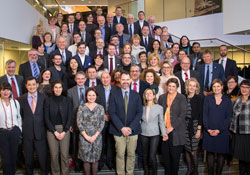Coalition of Partners

The Coalition of Partners (CoP) takes collective action to strengthen essential public health services and capacities across the WHO European Region. The CoP provides:
- a systemic platform for focusing efforts and resources in a meaningful and coordinated manner;
- a community of practice for learning, innovating and strengthening management practices within public health services; and
- new solutions, tools and projects to support the delivery of essential public health operations (EPHOs), with a particular focus on the 4 enabler functions of public health services.
Hashtag: #CoalitionofPartners
- Who is part of the CoP?
- 2018 activities (in collaboration with WHO/Europe’s public health services programme)
- Background
Who is part of the CoP?
The CoP is open to inviting and collaborating with decision-makers and experts from national public health services, international organizations and academia. To date, an interactive group of 42 partners has been contributing to the CoP’s draft Agenda for Action, developing comprehensive project proposals and providing input into how the CoP can move forward.
The CoP strives to capitalize on the momentum created by a renewed interest in public health services, revitalized partnerships, and innovative ideas on providing essential support to Member States in reforming their public health services.
2018 activities (in collaboration with WHO/Europe’s public health services programme)
- 13–15 February 2018, Munich, Germany: a CoP-led workshop at WHO/Europe’s high-level meeting on accelerating implementation of the International Health Regulations (IHR) (2005) to co-create actions towards strengthening IHR core capacities in the context of the development of a European 5-year action plan on implementing the IHR and reinforcing the linkages between health systems, essential public health operations and IHR core capacities.
- 16–18 April 2018, Sitges, Spain: a collaborative, country-focused CoP workshop on public health services at the WHO high-level meeting Health Systems Respond to Noncommunicable Diseases.
- 24–25 April 2018, Warsaw, Poland: the joint WHO–International Association of Public Health Institutes (IANPHI) seminar “Establishing national public health institutes through mergers – what does it take?”
- 19 June 2018, London, United Kingdom: a joint expert meeting co-led by WHO, the Association of Schools of Public Health in the European Region (ASPHER) and Imperial College London (United Kingdom) on public health workforce professionalization.
- 27–28 November 2018, Ljubljana, Slovenia: the 3rd meeting of the CoP at the European Public Health Conference, co-hosted by the Ministry of Health of Slovenia and WHO/Europe’s public health services programme.
- Throughout 2018: exploring feasibility to establish country-level coalitions for public health services, for example, in Slovakia and Slovenia.
- Throughout 2018: publication of tools following the country pilots.
Background
The European Action Plan for Strengthening Public Health Capacities and Services (2012–2020) (EAP-PHS) is a key implementation pillar of Health 2020, which aims to significantly improve the health and well-being of populations, reduce health inequalities and strengthen public health.
The values, aims and approaches of Health 2020 align with those of the 2030 Agenda for Sustainable Development. As such, the implementation of Health 2020 supports the achievement of the Sustainable Development Goals in the Region.
WHO/Europe’s public health services programme is the custodian of the EAP-PHS, and a leader on the EPHOs. The EPHOs are the backbone of the EAP-PHS and the associated country-level self-assessments.
The midterm progress report on the implementation of the EAP-PHS provided 2 key insights. First, more effort should be focused on providing expert technical support to Members States in relation to the enablers of public health service delivery, namely:
- public health legislation;
- investment in public health services (based on burden of disease and effective interventions);
- governance arrangements and organization of public health services; and
- a public health workforce with 21st-century public health competencies (knowledge, skills and attitudes).
Second, WHO and the international community at large should focus efforts and resources in order to provide a meaningful and coordinated response to the needs of Member States for strengthening their public health services.
To these ends, the public health services programme convened the CoP to develop the joint Agenda for Action. The Agenda will focus on the 4 enablers of public health service delivery, and on strengthening national prevention, health promotion and health protection capacities.



